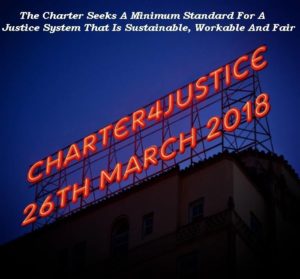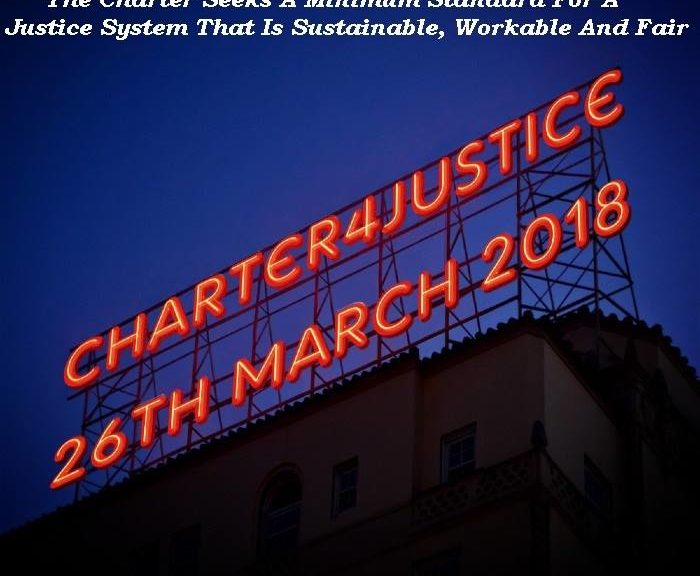On 26 March 2018 the Charter for Justice was launched by the London Criminal Courts Solicitors’ Association (LCCSA) together with the Criminal Bar Association (CBA) and Criminal Law Solicitors Association (CLSA).
In combination with other initiatives such as the one that can be read about here, the aim is to set out clearly the key principles needed to ensure a fair and properly functioning Justice system.
 The Charter was produced following engagement with the CBA, CLSA and the Howard League for Penal Reform. It is hoped that the Charter become a living, changing entity like the law itself, and is influenced by those who care about justice.
The Charter was produced following engagement with the CBA, CLSA and the Howard League for Penal Reform. It is hoped that the Charter become a living, changing entity like the law itself, and is influenced by those who care about justice.
The launch took place at the Law Society on 26th March. A panel of speakers, chaired by Greg Foxmith, addressed those attending on a number of issues.
- CBA chair Angela Rafferty QC spoke on funding issues and access to justice
- Laura Jane from the Howard League addressed the prison and probation crisis.
- Raj Chada talked tackling discrimination and prejudice at the police stations and in court.
- Jerry Hayes addressed ongoing issues with disclosure.
- Penelope Gibbs from Transform Justice discussed ideas of Open Justice.
The contents of the Charter for Justice are set out below:
Charter for Justice
Preamble
For too many years those who are close to the criminal justice system have observed the impact of funding restraints and cuts which have led to dilapidated buildings, reduced access to Justice, and a prison service on the point of collapse. The Lammy report has highlighted inequality of outcomes, and recently highlighted disclosure problems have shown systemic failures in the system.
This charter seeks to set the standards for a justice system that is sustainable, workable and fair.
1. Equal Access to Justice
Publicly funded representation is essential for defence and prosecution.
The CPS needs to be properly funded to properly present cases, and legal aid sufficiently available and remunerated to ensure equality of arms in an adversarial justice system, and to allow everyone access to legal advice and representation irrespective of mean
2. Disclosure
There should be full and fair disclosure of the Prosecution case to a suspect at the police station and defendant at court. Criminal justice is not a game, and proper disclosure needs to be made in a timely fashion so that those accused by the state can fully understand what they are accused of, and respond accordingly.
Failures in the disclosure process waste huge resources throughout the system and result in wrongful convictions, avoidable appeals and abandoned trials, damaging both the accused and victims of crime and undermining public confidence.
There is an urgent need to increase fairness, effectiveness and accountability within the disclosure process.
3. Open Justice
There should be no further court closures, and court buildings and their fabric should be maintained to an acceptable standard. The latest initiative of online pleas is a dangerous development that will remove the direct engagement that a defendant has with the court and legal representatives.
Every defendant or witness or member of the public should have a right to attend a court hearing in person.
The recent change to the Police and Criminal Evidence Act allowing the police to video-interview people wherever they choose without legal advice undermines vital protections for those suspected of crime and should be prohibited. This is especially dangerous for the young, those with mental health issues or learning disabilities, or for whom English is not a first language.
4. A humane and effective prison and probation service
Urgent action is required to upgrade and maintain the quality of prison buildings and facilities. There are too many people in prison and at risk of being sent to prison for failing to comply with conditions and urgent action is required to reduce the number of people in prison.
We must learn from other countries where prisons are more forward thinking and humane and re-offending rates are lower. There must be recruitment and retention of sufficient prison officers, and access to properly funded rehabilitation and education courses within the prison system.
The part privatisation of the probation service is a costly failure which should be reversed.
5. A Fair Justice system
Urgent action is needed to achieve equality of justice and eradicate the discrimination identified in the Lammy Report. Unless all have faith in the processes as well as the outcomes of our justice system, trust in the system will ebb away.
We need to work to eliminate unconscious bias amongst all those involved in the system through diverse recruitment, better training and rigorous monitoring.
Justice cannot be seen to be done when there are the clear differences in treatment and outcome identified in the Lammy Report, or arising through use of the legal concept of joint enterprise.

